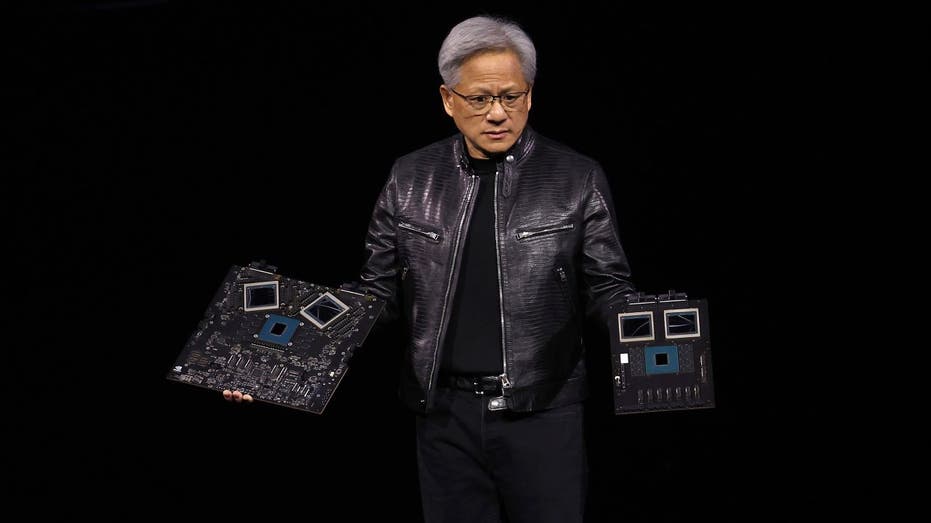Nvidia CEO Jensen Huang's Warning: China's AI Rivals Are Formidable

Table of Contents
China's Rapid AI Advancement
China's ascent in the AI arena is nothing short of remarkable. This meteoric rise isn't accidental; it's the result of a concerted national effort fueled by substantial investment and strategic planning.
Government Support and Investment
The Chinese government has made AI a national priority, pouring billions into research, development, and infrastructure. This commitment is evident in various initiatives:
- Made in China 2025: This ambitious plan significantly boosts AI development by prioritizing technological self-reliance and innovation.
- Massive Funding: Hundreds of billions of dollars have been channeled into AI research and development through government grants, subsidies, and venture capital initiatives.
- Favorable Regulatory Environment: China has created a regulatory environment that encourages AI innovation while addressing potential risks, though concerns regarding data privacy remain.
These policies have spurred the growth of a vibrant AI ecosystem within the country.
Talent Acquisition and Education
China's success is also driven by its burgeoning pool of AI talent. The country is graduating a vast number of engineers and researchers specializing in artificial intelligence, often surpassing Western counterparts in sheer volume.
- High Number of AI Graduates: Chinese universities are churning out thousands of graduates with expertise in machine learning, deep learning, and computer vision.
- International Collaboration: Chinese universities and research institutions are actively collaborating with leading global institutions, attracting top talent from around the world.
- Return of Overseas Talent: Many Chinese researchers and engineers who studied abroad are returning to China, bringing valuable experience and expertise.
This talent influx fuels the innovation engine of China's AI sector.
Key Chinese AI Players
Several Chinese companies are at the forefront of the AI revolution, challenging established global players.
Leading Companies and Their Technologies
China boasts a constellation of powerful AI companies, each specializing in various areas:
- Baidu: A leading player in natural language processing (NLP), with its Ernie chatbot rivalling ChatGPT. They are also significant contributors in autonomous driving.
- Alibaba: A giant in e-commerce and cloud computing, Alibaba leverages its massive datasets to excel in AI-powered recommendation systems and cloud-based AI services.
- Tencent: Known for its WeChat platform and gaming, Tencent is making significant strides in AI-powered gaming, social media analysis, and fintech.
- SenseTime: A leading provider of computer vision technology, particularly in facial recognition and AI-powered surveillance systems.
These companies are not just domestic players; they are increasingly making their mark on the global stage.
Competitive Advantages
Chinese AI companies possess several key competitive advantages:
- Massive Datasets: Access to enormous datasets generated by China's vast population and thriving digital economy provides unparalleled training data for AI models.
- Cost-Effectiveness: Lower labor costs and government support offer a significant cost advantage compared to Western competitors.
- Focus on Specific Niches: Chinese companies often specialize in specific AI applications tailored to the domestic market, gaining expertise and market share in those niches.
Implications for Nvidia and the Global AI Landscape
Jensen Huang's warning highlights the potential challenges Nvidia faces due to China's progress.
Nvidia's Position in the Market
Nvidia's GPUs are essential for training advanced AI models, giving them a dominant position in the market. However, China's advancements threaten this dominance:
- GPU Dependence: Many Chinese AI companies rely on Nvidia's GPUs, but China is actively developing its own alternatives to reduce this dependency.
- Market Share Concerns: The emergence of strong domestic competitors could erode Nvidia's market share, especially within the crucial Chinese market.
- Technological Competition: China's investment in developing its own high-performance computing chips presents a long-term threat to Nvidia's core business.
Geopolitical Implications
China's rise in AI has significant geopolitical implications:
- Technological Dependence: The West's dependence on Chinese manufactured goods and technologies creates vulnerabilities.
- Data Security Concerns: The use of Chinese AI technology raises concerns about data security and potential misuse.
- Trade Wars and Sanctions: The competition could escalate into trade wars and sanctions, impacting global technological progress.
Future of the AI Race
The future of the AI race between the US and China is uncertain, but Huang's warning highlights the need for vigilance:
- Increased Competition: Expect heightened competition in all aspects of AI development, from fundamental research to commercial applications.
- Technological Breakthroughs: Both sides will likely pursue technological breakthroughs to maintain their edge.
- Strategic Responses: Governments and businesses will need to develop sophisticated strategies to navigate this increasingly complex landscape.
Conclusion: Understanding Jensen Huang's Warning on China's AI Prowess
Jensen Huang's warning about China's formidable AI rivals is a crucial wake-up call. China's rapid AI advancement, fueled by massive government investment, a wealth of talent, and strategically positioned companies, poses a significant challenge to global tech leaders like Nvidia. The implications extend beyond the commercial sphere, impacting geopolitical stability and technological dependence. The future of AI will likely be shaped by the intensifying competition between the US and China. Stay informed about the evolving landscape of Artificial Intelligence and the growing influence of China's AI players. Understanding Nvidia CEO Jensen Huang's warning on China's AI rivals is crucial to navigating the future of this transformative technology.

Featured Posts
-
 Steffi Grafs Instagram Die Prominentesten Follower
May 30, 2025
Steffi Grafs Instagram Die Prominentesten Follower
May 30, 2025 -
 Warna Baru Kawasaki Versys X 250 2025 Performa Tangguh Desain Menarik
May 30, 2025
Warna Baru Kawasaki Versys X 250 2025 Performa Tangguh Desain Menarik
May 30, 2025 -
 Revenirea Lui Andre Agassi Un Nou Capitol In Cariera Sa Sportiva
May 30, 2025
Revenirea Lui Andre Agassi Un Nou Capitol In Cariera Sa Sportiva
May 30, 2025 -
 Experiencia Mejorada Para Fans Setlist Fm Se Integra Con Ticketmaster
May 30, 2025
Experiencia Mejorada Para Fans Setlist Fm Se Integra Con Ticketmaster
May 30, 2025 -
 Ticketmaster Aclara Sus Precios De Boletos Lo Que Necesitas Saber
May 30, 2025
Ticketmaster Aclara Sus Precios De Boletos Lo Que Necesitas Saber
May 30, 2025
Latest Posts
-
 Top 48 Things To Do In Washington D C In May Pride Celebrations Concerts And Art Exhibits
May 31, 2025
Top 48 Things To Do In Washington D C In May Pride Celebrations Concerts And Art Exhibits
May 31, 2025 -
 48 Events In Washington D C For May Pride Month Concerts And More
May 31, 2025
48 Events In Washington D C For May Pride Month Concerts And More
May 31, 2025 -
 48 Fun Things To Do In Dc This May Pride Concerts And Exhibits
May 31, 2025
48 Fun Things To Do In Dc This May Pride Concerts And Exhibits
May 31, 2025 -
 Lower Than Expected Q Quarter Earnings For Rbc What It Means For Investors
May 31, 2025
Lower Than Expected Q Quarter Earnings For Rbc What It Means For Investors
May 31, 2025 -
 Royal Bank Of Canada Rbc Earnings Report And Future Loan Prospects
May 31, 2025
Royal Bank Of Canada Rbc Earnings Report And Future Loan Prospects
May 31, 2025
